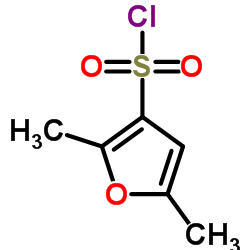2,5-DIMETHYL-3-FURANSULFONYLCHLORIDE
Modify Date: 2025-08-27 14:25:39

2,5-DIMETHYL-3-FURANSULFONYLCHLORIDE structure
|
Common Name | 2,5-DIMETHYL-3-FURANSULFONYLCHLORIDE | ||
|---|---|---|---|---|
| CAS Number | 166964-26-7 | Molecular Weight | 194.636 | |
| Density | 1.4±0.1 g/cm3 | Boiling Point | 263.1±40.0 °C at 760 mmHg | |
| Molecular Formula | C6H7ClO3S | Melting Point | N/A | |
| MSDS | N/A | Flash Point | 112.9±27.3 °C | |
| Name | 2,5-dimethylfuran-3-sulfonyl chloride |
|---|---|
| Synonym | More Synonyms |
| Density | 1.4±0.1 g/cm3 |
|---|---|
| Boiling Point | 263.1±40.0 °C at 760 mmHg |
| Molecular Formula | C6H7ClO3S |
| Molecular Weight | 194.636 |
| Flash Point | 112.9±27.3 °C |
| Exact Mass | 193.980438 |
| PSA | 55.66000 |
| LogP | 2.07 |
| Vapour Pressure | 0.0±0.5 mmHg at 25°C |
| Index of Refraction | 1.508 |
Synonym: Section 2 - COMPOSITION, INFORMATION ON INGREDIENTS
Risk Phrases: 34 Section 3 - HAZARDS IDENTIFICATION EMERGENCY OVERVIEW
Causes burns.Moisture sensitive. Potential Health Effects Eye: Causes eye burns. Skin: Causes skin burns. Ingestion: Causes gastrointestinal tract burns. Inhalation: Causes chemical burns to the respiratory tract. Chronic: Not available. Section 4 - FIRST AID MEASURES Eyes: Immediately flush eyes with plenty of water for at least 15 minutes, occasionally lifting the upper and lower eyelids. Get medical aid immediately. Skin: Get medical aid immediately. Immediately flush skin with plenty of water for at least 15 minutes while removing contaminated clothing and shoes. Ingestion: Do not induce vomiting. Get medical aid immediately. Inhalation: Get medical aid immediately. Remove from exposure and move to fresh air immediately. If not breathing, give artificial respiration. If breathing is difficult, give oxygen. Notes to Physician: Treat symptomatically and supportively. Section 5 - FIRE FIGHTING MEASURES General Information: As in any fire, wear a self-contained breathing apparatus in pressure-demand, MSHA/NIOSH (approved or equivalent), and full protective gear. Extinguishing Media: Use foam, dry chemical, or carbon dioxide. Section 6 - ACCIDENTAL RELEASE MEASURES General Information: Use proper personal protective equipment as indicated in Section 8. Spills/Leaks: Absorb spill with inert material (e.g. vermiculite, sand or earth), then place in suitable container. Section 7 - HANDLING and STORAGE Handling: Do not breathe dust, vapor, mist, or gas. Do not get in eyes, on skin, or on clothing. Use only in a chemical fume hood. Storage: Store in a cool, dry place. Store in a tightly closed container. Corrosives area. Store under an inert atmosphere. Section 8 - EXPOSURE CONTROLS, PERSONAL PROTECTION Engineering Controls: Facilities storing or utilizing this material should be equipped with an eyewash facility and a safety shower. Use adequate ventilation to keep airborne concentrations low. Exposure Limits CAS# 166964-26-7: Personal Protective Equipment Eyes: Not available. Skin: Wear appropriate protective gloves to prevent skin exposure. Clothing: Wear appropriate protective clothing to prevent skin exposure. Respirators: Follow the OSHA respirator regulations found in 29 CFR 1910.134 or European Standard EN 149. Use a NIOSH/MSHA or European Standard EN 149 approved respirator if exposure limits are exceeded or if irritation or other symptoms are experienced. Section 9 - PHYSICAL AND CHEMICAL PROPERTIES Physical State: Liquid Color: yellow Odor: Not available. pH: Not available. Vapor Pressure: Not available. Viscosity: Not available. Boiling Point: Not available. Freezing/Melting Point: Not available. Autoignition Temperature: Not available. Flash Point: Not available. Explosion Limits, lower: Not available. Explosion Limits, upper: Not available. Decomposition Temperature: Solubility in water: Specific Gravity/Density: Molecular Formula: C6H7ClO3S Molecular Weight: 194.64 Section 10 - STABILITY AND REACTIVITY Chemical Stability: Not available. Conditions to Avoid: Incompatible materials, exposure to moist air or water. Incompatibilities with Other Materials: Strong oxidizing agents. Hazardous Decomposition Products: Hydrogen chloride, chlorine, carbon monoxide, oxides of sulfur, carbon dioxide. Hazardous Polymerization: Has not been reported Section 11 - TOXICOLOGICAL INFORMATION RTECS#: CAS# 166964-26-7 unlisted. LD50/LC50: Not available. Carcinogenicity: 2,5-Dimethyl-3-furansulfonyl chloride - Not listed by ACGIH, IARC, or NTP. Section 12 - ECOLOGICAL INFORMATION Section 13 - DISPOSAL CONSIDERATIONS Dispose of in a manner consistent with federal, state, and local regulations. Section 14 - TRANSPORT INFORMATION IATA Shipping Name: CORROSIVE LIQUID, ACIDIC, ORGANIC, N.O.S.* Hazard Class: 8 UN Number: 3265 Packing Group: III IMO Shipping Name: CORROSIVE LIQUID, ACIDIC, ORGANIC, N.O.S. Hazard Class: 8 UN Number: 3265 Packing Group: III RID/ADR Shipping Name: CORROSIVE LIQUID, ACIDIC, ORGANIC, N.O.S. Hazard Class: 8 UN Number: 3265 Packing group: III Section 15 - REGULATORY INFORMATION European/International Regulations European Labeling in Accordance with EC Directives Hazard Symbols: C Risk Phrases: R 34 Causes burns. Safety Phrases: S 26 In case of contact with eyes, rinse immediately with plenty of water and seek medical advice. S 36/37/39 Wear suitable protective clothing, gloves and eye/face protection. S 45 In case of accident or if you feel unwell, seek medical advice immediately (show the label where possible). WGK (Water Danger/Protection) CAS# 166964-26-7: No information available. Canada None of the chemicals in this product are listed on the DSL/NDSL list. CAS# 166964-26-7 is not listed on Canada's Ingredient Disclosure List. US FEDERAL TSCA CAS# 166964-26-7 is not listed on the TSCA inventory. It is for research and development use only. SECTION 16 - ADDITIONAL INFORMATION N/A |
| Hazard Codes | C: Corrosive; |
|---|---|
| Risk Phrases | R34 |
| Safety Phrases | S26-S36/37/39-S45 |
|
~21% 
2,5-DIMETHYL-3-... CAS#:166964-26-7 |
| Literature: Texas Biotechnology Corp. Patent: US6342610 B2, 2002 ; Location in patent: Page column 86 ; US 6342610 B2 |
|
~% 
2,5-DIMETHYL-3-... CAS#:166964-26-7 |
| Literature: US5962490 A1, ; US 5962490 A US2002/95041 A1, ; US5594021 A1, ; US 5594021 A |
| Precursor 2 | |
|---|---|
| DownStream 0 | |
| 2,5-dimethyl-furan-3-ylsulphonyl chloride |
| (2,5-dimethyl(3-furyl))chlorosulfone |
| 2,5-Dimethyl-3-furansulfonyl chloride |
| 2,5-dimethyl-3-furylsulphonyl chloride |
| 3-Furansulfonyl chloride, 2,5-dimethyl- |
| 2,5-dimethyl-furan-3-sulfonylchloride |
| 2,5-Dimethyl-3-Furansulfonylchloride |

